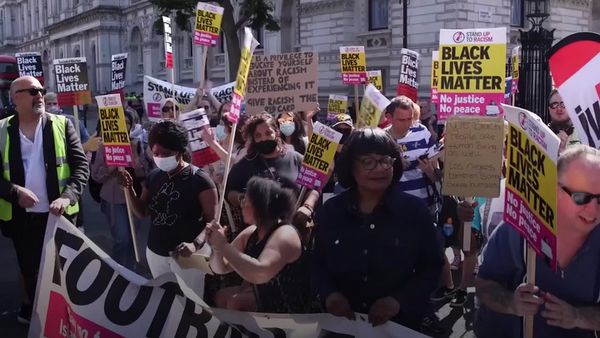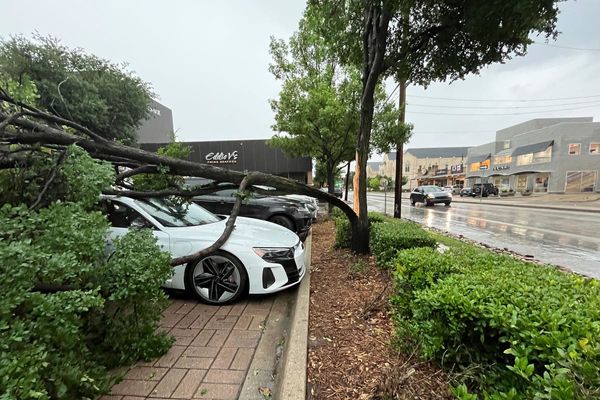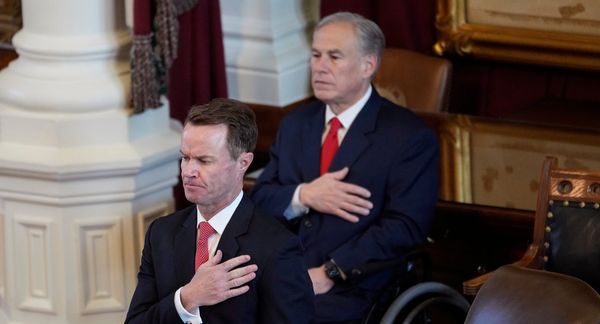
“When I was a child I caught polio, and I can’t walk to the bus stop and I can’t stand at the bus stop, so this door-to-door service, it’s just so necessary,” says Annabel Marsh as she climbs gingerly into the bright yellow Woking Bustler.
She is on her way to a daycare centre together with four other elderly passengers, each picked up from home by a long-serving driver, John McDonald, who patiently helps them board.
Woking Community Transport runs this service of 20 buses with the help of a direct grant it received in 2022-23 worth more than £170,000. But that support is set to fall away as the local borough council implements a drastic package of cuts. The council in effect declared bankruptcy last year after an extraordinary speculative spree went badly wrong.
Sitting near Marsh, Dave Maddison says he uses the service “every day of the week, Monday to Friday”. “It is very, very convenient and the drivers are really helpful and kind,” Maddison says. Without it, he says, “we’d be really stuck”. At the day centre he enjoys “a bit of entertainment, lunch – it’s very, very nice”.
Earlier, McDonald took two elderly women to a dementia support centre; later, he will take Jean Boot into Woking town centre to do a spot of shopping and Joan Griffiths to visit her sister-in-law.

“It’s usually about once a week. Sometimes I miss a week, only because I’m a bit dodgier on my feet now. But it does get me out of the house and gets me walking about a bit,” says Boot, who explains that the shopping trolley she likes to lean on to keep her steady doesn’t fit easily into a taxi. “I’m not coming up to town next week, I’m going to the hairdressers,” she adds.
Griffiths, who is wearing a cheerful purple coat and turns 80 next month, says of the bus service: “I use it nearly every day and I don’t know what I’d do without it. So many people that use it are people that can’t get out – and if you can’t get out, what are you going to do? You’re going to get so depressed.”
Guy Padfield-Wilkins, who runs Woking Community Transport, says he will struggle to keep the Dial-a-Ride service going without the council grant – particularly as they have also been benefiting from cheap rent in a council-run building that is set to end as the town hall rationalises its property assets.
“Their only proposal to us is to reduce the service down to the bare bones and then charge people more money,” he says. Users of the Dial-a-Ride service pay about £4.60 a journey; he reckons that would have to shoot up to £26 to meet all the costs.

The Bustler’s uncertain future is just one example of the cuts being imposed across the borough as Woking battles to balance the books. The communities secretary, Michael Gove, sent in independent commissioners in May last year to oversee the recovery plan.
Woking council’s former Conservative leadership invested in skyscrapers, farmland and property ventures, amassing £1.2bn in debt – or about £12,000 for every Woking resident – much of it to buy assets now worth less than their purchase price.
As a first step towards restoring financial sustainability, the council, now run by the Liberal Democrats, has proposed an eye-watering £8m-worth of day-to-day spending cuts from its £15m core budget, part of a wider plan that will also include selling off assets over three to five years and appealing to the government for support.
Woking council’s leader, Ann-Marie Barker, says: “There’s a lot to make happen in a short time, and it’s not going to get any easier for a long time.”

When the proposal for emergency spending cuts was published last autumn, Woking Community Transport was one of several local groups that the council said it would no longer directly support.
Money-saving plans also include closing public toilets, withdrawing funding for local community centres and merging four daycare centres for elderly people into one site, with fewer places available. Sixty council staff are set to lose their jobs.
Barker says the council envisages the Dial-a-Ride service operating on a smaller scale at a higher cost to users and suggests the central focus is likely to be disabled people.
“We were really concerned about the Dial-a-Ride service and the people, particularly those with a disability – those in a wheelchair, for example. There are other options, there are local care schemes that give people a lift to places. That covers and works for lots of people but they can’t cope with wheelchairs, for example, and that’s where the Dial-a-Ride comes into play. We’re talking to them in a way they might be able to continue providing a reduced service into the future.”

Across the council’s cuts programme, Barker is keen to stress the mitigations it is pursuing. It has been working with various local groups that could take over the running of the threatened community centres, for example, under a scheme known as a community asset transfer.
Woking has been offering other support to local charities, helping them apply for National lottery funding, for example, but she says ruefully: “We can’t just keep giving you money – money that we probably didn’t have, because we gave lots of money to charitable groups, they did great stuff with it, but it was all money that we’d borrowed and we couldn’t really afford.”
Back on the Bustler, the driver McDonald fearsthe impact higher prices or the service closing would have on many of his long-time passengers. “A lot of them would stay in and look at their four walls, and that’s hit their quality of life, at a time when it takes away their last pleasure,” he says.







